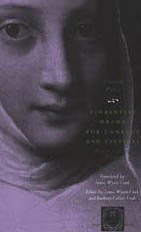
Florentine drama for convent and festival : seven sacred plays PDF
Preview Florentine drama for convent and festival : seven sacred plays
FLORENTINE DRAMA FOR CONVENT AND FESTIVAL A Series Edited by Margaret L King and Albert Rabil, Jr. Antonia Ptllci FLORENTINE DF~AMA FOR CONVENT AND FESTIVAL Seven Sacred Plays Annotated and translated by James Wyatt Cook Edited by James Wyatt Cook and Barbara C0Iiier Co0k THE UNIVERSITY OF CHICACO PRESS Chicago London & JamesWyatt Cookis professor of English at Albion College. The Umversrty of Chicago Press, Chicago 60637 The l.Iruversrty of Chrcago Press, Ltd, L.ondon © 1996 by The University of Chicago All fights reserved Published 1996 Prrnted In the United States of Amenca 05040302010099989796 12345 ISBN 0-226-68516-0 (cloth) ISBN: 0-226-68517-9 (paper) LIbrary of Congress Cataloging-tn- Pubhcation Data Pulci, Antonia, 1452-1501. [Works English 1996] Florentine drama for convent and festival seven sacred plays / Antonia Puler , annotated and translated by James Wyatt Cook , edited by James Wyatt Cook and Barbara Collier Cook p. cm - (The other vOICeIn early modern Europe) Includes bibliographical references and index ISBN 0-226-68516-0 (cloth alk paper) ISBN 0-226-68517-9 (paper alk paper) 1 Pulci, Antonia, 1452-1501- Translations into English 2 ReligIOUS drama, Italian-Translations mto English I Cook, James Wyatt, 1932- II Cook, Barbara Collier m.Title. IV Series PQ4630 P8A23 1996 852' 3-dc20 96-12766 CIP @The paper used In this publication meets the minimum requirements of the American National Standard for lnforrnauon Sciences-Permanence of Paper for Pnnted Library Materials, ANSI Z39.48-1984 Thistranslationisfor LeoWyatt Cook and JoshuaGilbertDaut)hinais ourthirdandfourthgrandchildren, whoarrived aboutthesametimeasthisbook. CONTEN'TS Editors' Introduction to the Series IX Acknowledgments xxix Antonia Pulci and Her Plays 3 TheOtherVOice,theNoblerDeed,theWomanlyConcern3 • BIOgraphy10 LiteraryAntecedents21 • AnalysIs 23 • ThePulClCanon27 Performance32 • Aftermath34 • PnnClt,[eosfThisTranslation37 SuggestionfsorFurtherReading38 The Play of Saint Francis 47 The Play of Saint (Flavia) Domitilla 75 The Play of Saint Guglielma 103 The Play of the Prodigal Son 135 The Play of Saint Anthony the Abbot 155 The Play of Saint Theodora 187 The Play and Festival of Rosana 217 The Second Part of the Festival oj Ulimentus and of Rosana 241 Index 277 THE OTHER VOICE IN EARLY MODERN EUROPE: INTRODUCTION 'r o THE SERIES MargaretL KingandAlbertRabil,Jr. THE OLD VOICE AND THE OTHER VOICE In western Europe and the United States women are nearing equality in the professions, in business, and in polities. Most enjoy access to education, reproductive rights, and autonomy in financial affairs. Issues vital to women are on the public agenda: equal pay, child care, domestic abuse, breast cancer research, and curricular revision with an eye to the inclusion of women. These recent achievements have their origins in things women (and some male supporters) said for the first time about six hundred years ago. Theirs is the "other voice," in contradistinction to the "first voice," the voice of the educated Olen who created western cul ture. Coincident with a general reshaping of European culture in the period 1300 to 1700 (called the Renaissance or Early Modern period), questions of female equality and opportunity were raised that still re sound and are still unresolved. The "other voice" emerged against the backdrop of a 3,OOO-year history of misogyny-the hatred of women-i-rooted in the civiliza tions related to western culture: Hebrew, Greek, Roman, and Chris tian. Misogyny inherited from these traditions pervaded the intellec tual, medical, legal, religious and social systems that developed during the European Middle Ages. The following pages describe the misogynistic tradition inherited by early modern Europeans, and the new tradition which the "other voice" called into being to challenge its assumptions. This review should serve as a framework for the understanding of the texts pub lished in the series "The Other Voice in Early Modern Europe." Introductions specific to each text and author follow this essay in all the volumes of the series. ix
